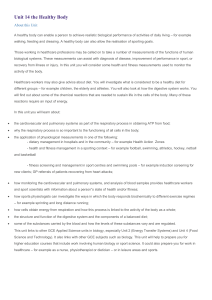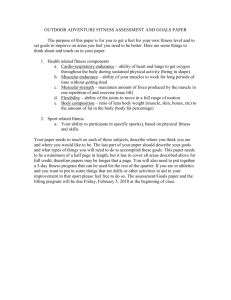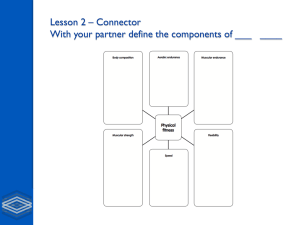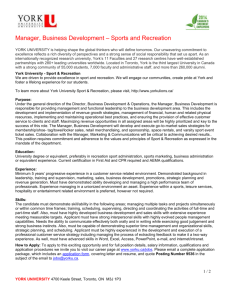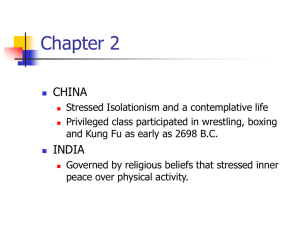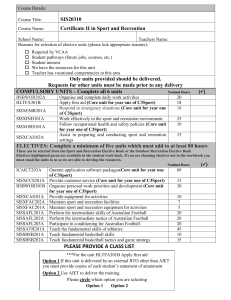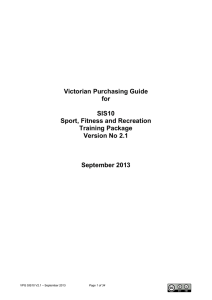Cert III in Fitness
advertisement
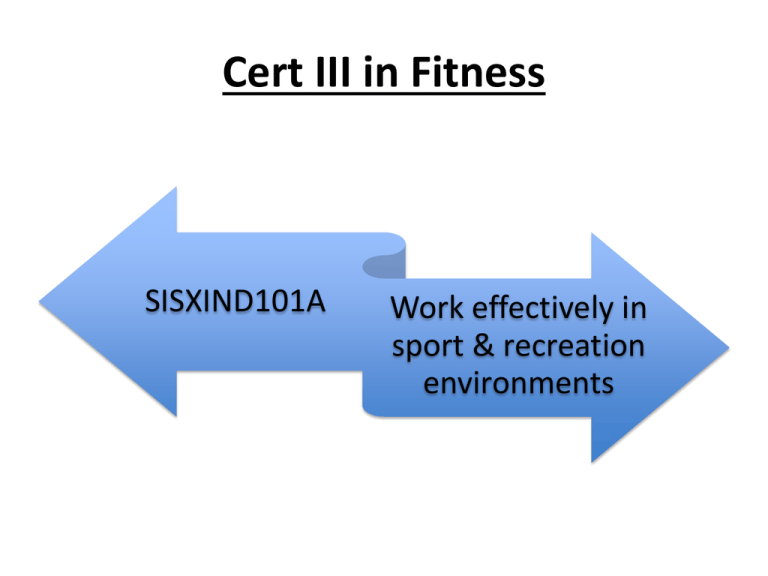
Cert III in Fitness SISXIND101A Work effectively in sport & recreation environments fun community involvement fitness choice leisure indoors Sport and recreation outdoors, Increase in leisure time assists in breaking down cultural and ethnic barriers, Benefits to members of the community healthier and active community, fitness Barriers that may prevent people from taking part in regular physical activities (Andrew Larkin 2008) Time poor Work on time management and find a convenient sporting solutions. Financial Find an activity that suit your budget, it’s free to walk. Boredom Find something of interest keep it challenging or competitive with some variety. Lack of motivation. Have a support crew, renew your goals on a regular bases. Lack of skills or inappropriate goals Start with what you can do then build on them as you go and getting correct advice from professionals. Feeling uncomfortable training environments Go with a friend for the first few times. Feeling physically tired in Make sure the program isn’t too demanding and you have adequate nutrition. Media books experience Source information relevant to the fitness industry industry associations and organisations personal observations industry journals unions Changes to organisation timetables, policies or procedures Medical or scientific research on a matter related to exercise, health or fitness Survey and or statistic results about a particular sport A community event New qualification required to work in the industry How to share your updated knowledge Administration, Newsletters. Facility design and management Fitness Marketing and public relations Coaching Outdoor recreation Biomechanics Sport for people with disabilities How to share your updated knowledge Physiology Sociology of sport Sports Law Statistics Sports science Work shops Recreation management Psychology Trails How to share your updated knowledge Demonstratio ns internal and external Corporate, elderly, male and female of most age groups. people from a range of social, cultural and ethnic backgrounds customers with routine or special requests Clients can be regular and new Impact on volunteers Effect on local amenities or facilities National pride Affect on local communities Positive and negative impacts on health Community role in recreation Economy Qualification to work as a personal trainer Certificate IV in Fitness Private sector Are geared to make a profit for the owner, funded by private investors. Public sector Is a non- profit organisation funded primarily by government and fund-raising Example A private swimming pool with higher entry cost but facilities may be at a higher standard. Example A public swimming pool with low entry cost Volunteers Adults who volunteer in Australian Sport and recreation • 1.5 million How much is this voluntary contribution worth • 2 billion dollars a year A sense of feeling good about helping others Enhancement of own knowledge and skills Community spirit Personal benefits from volunteering May lead to employment Building relationships/friendships codes of conduct complaint procedures and response times client referral procedures antidiscrimination consumer protection duty of care Organisation policies and procedures emergencies organisational report forms reporting procedures occupational health and safety risk minimisation industrial relations equal opportunity working with children Organisation policies and procedures workplace relations Language Health Cultural Specific needs due to background variety Social Physical Economic Changed the speed of your language to accommodate a client whose English language was poor as it was their second language Adaptation to client background Orientation method adapted to accommodate a client in a wheelchair Researched different types of exercises that were safe during pregnancy professional relationship inclusive and non– discriminatory practices client relationships Ethical practices operation of community recreation organisation professional standards of customer service information collection, storage and dissemination Community development philosophies and principles Social justice • refers to the idea of creating a society or institution that is based on the principles of equality and solidarity, that understands and values human rights, and that recognizes the dignity of every human being Human rights • "basic rights and freedoms that all people are entitled to regardless of nationality, sex, national or ethnic origin, race, religion, language, or other status. Empowerment • refers to increasing the spiritual, political, social, or economic strength of individuals and communities. It often involves the empowered developing confidence in their own capacities Design a brochure that you could use in a sport and recreation or fitness facility that reflects the three factors. Your brochure is to be informative colourful and relevant to the facility or industry. sexual preference, disability, religion yelling, screaming or offensive language colour, race, sex, marital status physical or verbal abuse excluding or isolating employees psychological harassment, intimidation Discrimination and unlawful behaviours recruiting and selecting staff who is considered and selected for transfer, promotion, retrenchment or dismissal assigning meaningless tasks unrelated to the job who receives training and what sort of training is offered terms, conditions and benefits offered as part of employment giving employees impossible jobs Discrimination and unlawful behaviours deliberately changed work rosters to inconvenience particular employees sending explicit or sexually suggestive emails displaying offensive or pornographic posters or screen savers making derogatory comments or taunts about someone’s race or religion telling insulting jokes about particular racial groups undermining work performance by deliberately withholding information vital for effective work performance Discrimination and unlawful behaviours asking intrusive questions about someone’s personal life, including their sex life Language Cultural modesty No value for sport or fitness Fear of racial discriminat ion Dress Cultural barriers Religion, Race & ethnic origin Lack of confidence & ability Cultural barriers Security seekers • ethnic origin, culture (and religion for some) is a fundamental part of their lives. Harmony seekers • place high value on their ethnic origin and culture, but are more open to exploring and potentially valuing other ways of life. Independen ce seekers • view themselves and conduct their lives as primarily part of the broader society. They are likely to be second or third generation, and have little or no experience of their family’s country of origin. They tend to believe that sport is, and should be, for anyone who enjoys it, and they tend to engage in ethnically integrated sporting activities. Education Advertisement Communication Overcome by Awareness day Inclusive practices Work shops Appropriate activities to best suit the following needs Improve posture Gym, Yoga, Physio Arthritis in most joints Swimming, yoga Muscle gain Gym Knee construction Gym, Yoga, Swimming, Running, Cycling, Physio, Doctor Motivation low Doctor, Counsellor, Physio Overweight & high blood pressure Doctor internal and external people from a range of social, cultural and ethnic backgrounds regular and new family’s Different types of clients customers with routine or special requests corporate groups elderly clients with special needs Importance of client feedback Offers you an opportunity to improve your business • a. Design a form with a questionnaire that is used to collect client feedback. • b. Ask another student or colleague to complete and they are to include two negative responses/complaints. • c. Design a form that shows how you have responded to the negative feedback. This will include any actions to remedy the negative response or complaint. encourage open communication develops cooperation in a team constructive feedback Risk Assessment means taking a systematic approach to looking at what could cause harm to people. Why is it important to do a risk assessment on your environment before you start any activities By assessing risk, you know where potential problems and dangers lie, and can, therefore, take measures to prevent them. To ensure the safety of clients How would you go about doing the risk assessment One way to do this is to produce a table. It helps to involve the people actually engaged in, or experienced in the particular activity. The first step is to isolate an activity and identify who and what would be involved. From this you can then create a list of risks and hazards. Activity Hazard Swimming carnival depth of water, slippery surfaces, drowning, sunburn Wake boarding drowning, dangerous objects, damaged safety equipment Touch football uneven playing surface, bad weather, high temperature Basketball water on court, over-heating of player Visit to the gymnasium lack of orientation on how to use equipment safely leading to injury Anti-social side line behaviour from spectators If the behaviour becomes too aggressive call the police. In threatening situation you may be able to approach the offender and inform them on appropriate crowd behaviour If you have crowd security they may be able to do this for you What would you do to distinguish the situation now and for the future Provide information on crowd ethics and behaviours. This can be done through media, This can be done through media, newsletters, meeting and poster. Apply first aid Call an ambulance. Actions you would need to take if a client injured their ankle Tell someone reliable where you are going and when you will be back Take plenty of water and snacks, First aid kit Bush walk with school students Wear appropriate clothing for conditions and apply Sun protection Take a mobile phone [satellite is preferable] maps & navigation equipment Purpose of hazard control in the workplace Minimise the risk of accidents human perils professional liability Fire and flood are classified as property damage economic perils suggestions for changes to the safe use program campaign to educate the public characteristics of the audience and the subject matter to be presented workers’ compensation insurance provides payment for medical expenses and rehabilitation programs for a worker injured at work the organization CEO is role model for spectators participants Pollution Pollution is the introduction of contaminants into a natural environment that causes instability, disorder, harm or discomfort to the environment Situations that may arise that could endanger yourself Verbal abuse Physical aggression Emergencies Productivity table – relating skills to employability RESPONSES WILL VARY ACCORDIN TO STUDENT Provide 2 examples of how you have or could put these skills into action in the workplace. You have been given two examples. Oral Assessment Importance of knowing something about nature of historical, cultural or physical factors affecting participation of youths from specific communities • For the organization to hold a successful, safe and friendly event • To brining understanding and respect to the individual and community from different backgrounds to overcome barriers. • Knowing the law and legislations Relate and understand the information When you distribute information to the group you are communicating with Used to prevent further injury jumpers as a sling Number to call when 000 does not work 112 Hospitality Public service (police) Transport Retail Industries involved in major sporting events Tourism
